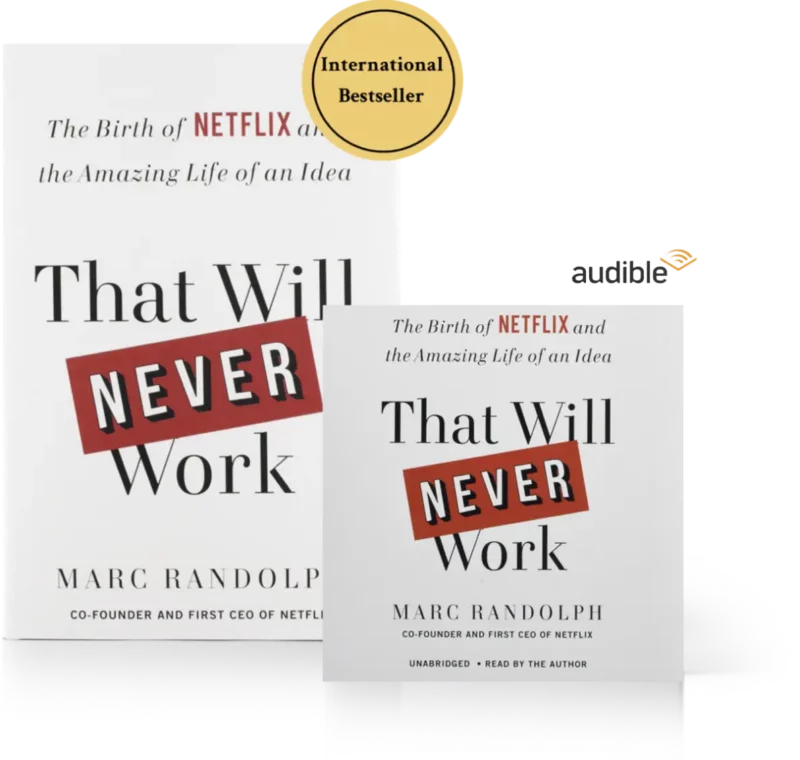Looker, Netflix, and Fruit Trees: A Few Thoughts on the Meaning of Success.
A Few Thoughts on the Meaning of Success.

Last week, Google announced that it was acquiring Looker, the Santa Cruz-based data analytics company where I’ve worked in various roles since 2011.
The day the news hit, I was working on the last chapter of my new book, which tells the story of the day seventeen years ago when Reed Hastings, my son Logan, and I flew to New York City to watch Netflix go public.
All last Thursday, as I fielded congratulatory phone calls from friends, part of me was back in 2002, on the Merrill Lynch trading floor with Reed and Logan. I was struck, not for the first time, by the parallels between the Looker story and the Netflix story.
Like Netflix, Looker started as nothing more than an idea. Lloyd Tabb and Ben Porterfield were two brilliant engineers who had figured out a better way for businesses to see and analyze their data, and they asked me to join them to help out with the ABCs — that’s short for Anything But Coding.
Like Netflix, everyone did a little bit of everything at the beginning. My title back in 2011 was “biz” — seriously, Lloyd’s was “tech” — but I did everything from setting up payroll, to buying tables and chairs for the office, to hiring a graphic designer to create Looker’s first logo. (We couldn’t afford his rate, so I threw him some stock options.)
Like Netflix, Looker began as a resolutely Santa Cruz company, one with a relaxed, laid-back ethos. (Unlike Netflix, it stayed in Santa Cruz.) Ben and Lloyd understood — as I had, back in 1997 — that locale drives culture, and that more than a few of the 19,000 tech workers who called Santa Cruz home were tired of driving an hour each way “over the hill” into Silicon Valley.
And like Netflix, Looker grew into something that its original founders could never have anticipated. As Looker got larger, the talented people we hired started to see things that we couldn’t. And what had looked like a company the three of us could run out of our houses for a few hours a day became something bigger. Much bigger.
Here’s a simple truth: When you surround a good idea with brilliant people, it changes. No matter how much you plan, great ideas have a mind of their own. Companies become what they want to become.
Netflix began as simply a way to rent and buy DVDs through the mail, and ended up as a paradigm-shifting subscription service at the forefront of the streaming revolution. Looker started as a small-business-focused company, and ended up as an enterprise-strength data platform, complete with its own programming language. Today, it helps more than a thousand businesses of all sizes understand their data in ways that were unimaginable back in 2011.
Just as I did at Netflix, I gradually — over seven years — ceded day-to-day operational responsibilities at Looker to the specialists we brought in to grow the company. At this point, my title is limited to “Board Member.” And I’m fine with that.
More than fine, actually. Because for me, the pleasure of working with start-ups is being along for the first part of the ride, right when the dream is turning into a reality. I’m an early-stage guy. Always have been, always will. It’s what I love.
A lot of the time, it doesn’t work out. A product doesn’t catch on. New users don’t keep pace with churn. Your burn rate is too high, and funding gets harder and harder to come by. After Netflix, I had a long string of what I call small exits: I worked on the ground floor as a mentor, investor, and advisor to a number of startups that ended up where most startups end up: right back where they started.
I’m proud of everyone at Looker, and of all the work we’ve been able to do together. But I’ve come to realize that if you tie your happiness and definition of “success” to an IPO or a major acquisition, then you’re doing it wrong. The big payday, the A.P. wire story with a flashy number in the headline — these are the exceptions, not the rule.
In my book, I compare it to the fruit trees I planted at my house around the time Netflix was just getting off the ground. You work in start-ups not because you like to eat oranges straight off the tree. You work in start-ups because you like planting saplings and helping them grow.
And then sometimes, through some alchemy of talent, leadership, timing, skill, and luck — usually a lot of luck — your idea bears fruit. Back in 2002, that afternoon in New York, I got to call my mom and tell her that the $25,000 she’d invested at the seed stage for Netflix — and that she’d never thought she’d see again — could buy her a new apartment. This week, I had the pleasure of calling up that graphic designer Looker couldn’t afford back in 2011, and telling him that the stock options we’d thrown his way had just made him a millionaire.
He won’t see any of that money for a while, of course. The government still has to approve the acquisition, which could take months.
And hey, I know how he feels. Back in 1997, I was in a similar spot — stuck in an office with nothing to do while the government approved a big corporate merger that my boss Reed Hastings had just engineered. That’s when I started bouncing ideas for a new company off him during our carpool from Santa Cruz to Sunnyvale — something about renting DVDs through the mail.
The rest, as they say, is history. Or just chapter one of my book.
RECOMMENDED FOR YOU
Congratulations on Landing Your First Job...
Podcast Episode 72
Is it a Culture Problem or a Hiring Problem?
October 25, 2022 • 38 min
